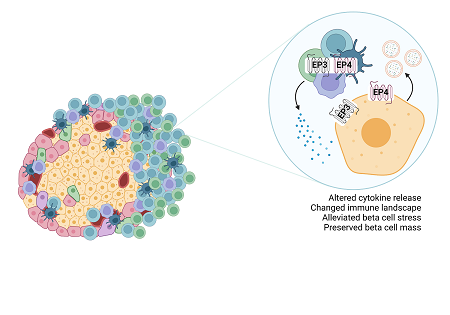
Type one diabetes (T1D) is a disease characterized by targeted autoimmune destruction of the beta cells in the pancreas. Destruction of critical beta cell mass leads an individual to completely lose the capability to produce insulin and maintain euglycemia. To reverse or prevent onset of this disease, beta cell survival must be promoted and autoimmune attack dampened. Prostaglandin E2 (PGE2) is a lipid signaling molecule involved in inflammation and is elevated under many metabolic conditions. Our lab and others have demonstrated that PGE2 signaling through EP3 and EP4 receptors can have significant effects on cellular function and phenotype in both beta cells and leukocytes. We are interested in investigating the specific roles that EP3 and EP4 play in autoimmunity, and how modulating receptor activity may be able to prevent or reverse T1D pathogenesis.
